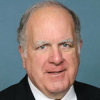John Spratt

John Spratt
John McKee Spratt, Jr.is an American politician who was the U.S. Representative for South Carolina's 5th congressional district from 1983 to 2011. He is a member of the Democratic Party. Spratt was the dean of the South Carolina congressional delegation, chairman of the U.S. House Committee on the Budget, and the second ranking Democrat on the U.S. House Committee on Armed Services, where he served on three subcommittees: Oversight and Investigations, Strategic Forces, and Air and Land Forces. In addition...
NationalityAmerican
ProfessionPolitician
Date of Birth1 November 1942
CountryUnited States of America
This budget is not going to put us on a path to balancing the budget. Not in five years, not in 10 years, not in 20 years. It would put us on a path to endless deficits and a Mount Everest of mountainous debt.
Once we got the budget today, we found out why it was so long coming,
I am not disputing the need for this money. What I am disputing and calling attention to is the fact that we are taking the tab for defense in our time against terrorists in the Middle East and elsewhere and shoving this tab off onto our children.
Your tax cut gets bigger and bigger as time goes on and it takes huge cuts out of all of these accounts, including defense.
The disturbing thing about the Bush forecast is that we are not just looking at the cyclical downturn -- a return to budget deficits because the economy is down, ... Fox News Sunday.
And it raises a fundamental question: How long can we move the world in one direction while we move in another direction, and do we want to backslide into an era that we finally emerged from where we had a nuclear weapon for every tactical mission?
This hurricane is one more argument, and a strong one, for higher conservation requirements.
Democrats and Republicans alike support our military personnel.
This war so far has cost us $125 billion and counting, because largely we decided to do it on our own, with only the United Kingdom as a paying, fully participating partner.
Just a few short years ago in the year 2000, the last full fiscal year of the Clinton administration, this country was running a surplus of $236 billion.
We have got thousands of nuclear weapons in order to achieve deterrence.
We can have tax cuts, but when we have tax cuts and do not have a surplus, the amount of the tax cut goes straight to the bottom line, adds to the deficit, and the deficit adds to the national debt, and sooner or later, the debt has to be paid.
Our country, the United States of America, may be the worlds largest economy and the worlds only superpower, but we stretch ourselves dangerously thin by taking on commitments like Iraq with only a motley band of allies to share the burden.
We developed during the 1990s a series of budget process rules that helped us bring to heel these deficits, diminishing every year and moving the budget so into surplus.